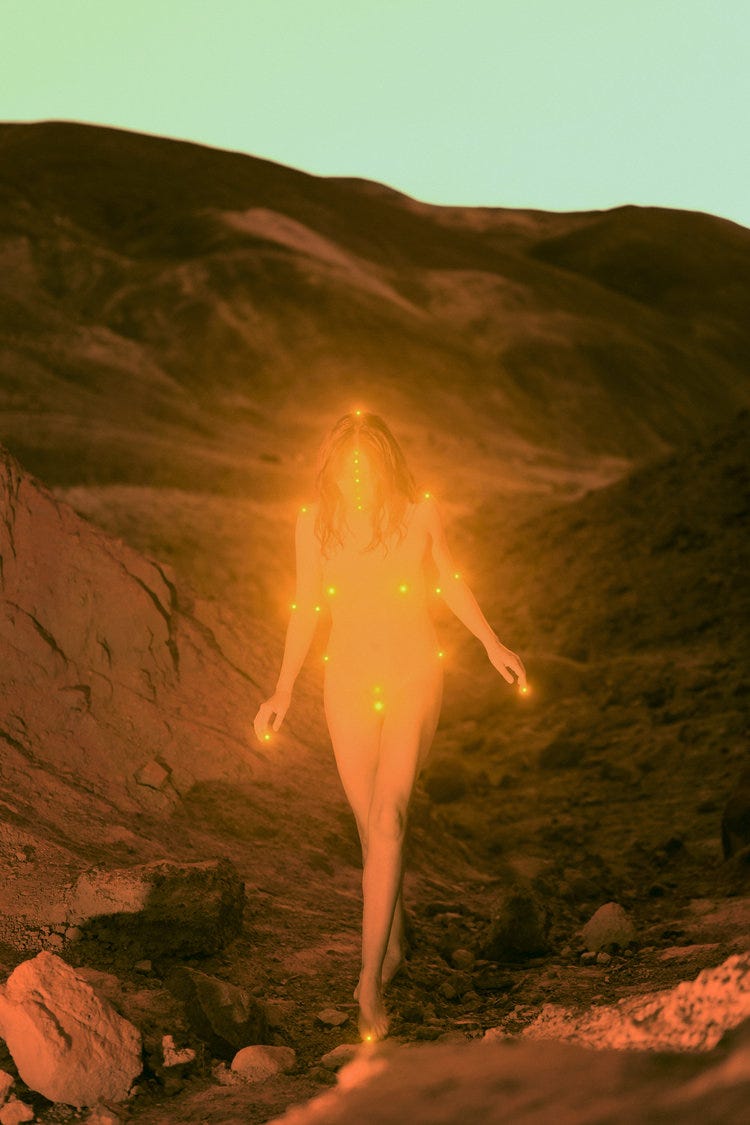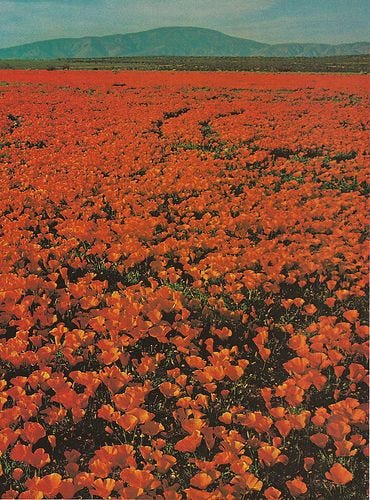Photograph from Phantom by Neil Krug
Outtake from my upcoming memoir The Body Is a Doorway available for pre-order. Originally written Summer 2021.
The mushrooms taste ashen, discordant with the blonde light washed through willow fronds, the frothy chatter of the water dividing around a recently fallen tree, lodged between stones, lying vertical in the water like a wooden splint correcting the flow of the current. You lie back on your blanket, unconvinced that a handful of dusty fungus might “do” anything. But shortly, watching the clouds weft across the sky’s blue warp, you realize you have not been a passive audience to the beauty of the day, the riverside, the starling song in a nearby oak tree. You have been woven into the tapestry so deeply you can no longer clearly feel your skin as a boundary. Instead, it is diaphanous as the clouds themselves. You are spun through with spores and wind and the stream’s stone-articulated mantra. To say you are connected lacks precision. You are the connection itself, interstitial, the spit-glossy mycelia woven between tree and plant, grass and orchid.
Ecodelia, a word coined by Richard Doyle, encapsulates the potent ability of certain plants and chemicals, notably psilocybin mushrooms, to catalyze “nature connectedness”. Doyle stresses that ecodelics are evolutionary beneficial, increasing our reproductive viability as “eloquence adjuncts”. Think of birdsong and mating dances. Doyle says that ecodelics like psilocybin gift us with enchanting gab, making us more enticing mates and increasing our ability to pass along our genes. In an age of capitalist ecological pillaging, ecodelics might also be acting as an evolutionary adjunct in saving our very species from self-extinction. In order to protect nature, we must understand that we are nature. Many studies have shown that ecodelic substances highlight connection in general, showing us that we are constituted by context. Ecological context. The biome we breathe in. The nitrogen-fertilized plants we consume. The sunlight that, inconceivably, draws an oscillating photon of intimacy across 93.112 million miles into your particular iris, coordinating your hormones, your sleep, your ability to REM dream. The ability of ecodelics to “wake up” connection to nature is not gossip. It has repeatedly shown up in peer-reviewed scientific studies judging mental health and ecological awareness in relationship to psychedelic therapy.
But there is something in the current discourse about psychedelics, even when they are reframed relationally as ecodelics, that disagrees with me. It is important to note that as a survivor of abuse who has struggled with PTSD, I have benefited from psilocybin and the ability of these medicines to create new neural pathways towards health. But as psychedelic therapy becomes increasingly popular and commercial, I think it is always important to massage the teleology of ecodelics. Modern human beings enjoy defining thing – be they plant, fungi, animal, stone, or abstraction – in terms of their usefulness. This teleology wedded to taxonomy creates a small box where a being can “mean” for us. I have seen this problem threaded through the current cultural fascination with fungi. Fungi are suddenly considered worthy of love and study because of their ecological remediation capabilities, their medical properties, and their psychedelic exuberance. We often make arguments for the preservation of old growth forests and ecosystems through an explanation of their resources
If I have a maxim, it is this: decenter human narratives. We have held center stage for too long. And our monomaniacal claim to ecological authorship has not delivered us to a happy conclusion. When I think about ecodelics and nature-connection, I find that the culture of consumption is lurking behind the popular narratives. Why must we take more, in order to learn to take less? In order to feel real, you must consume something. You must take something. In order to stop committing violence against the earth, you need to find the substance that stops you from doing the violence. Is it just me or is the discourse somehow reifying our artificial divide between human beings and nature? We need our “plug in” in order to re-enter the ecosystem. We need our heroic dose download in order to hear the birdsong.
I’m not saying we shouldn’t consume these helpful plants and fungi. I deeply honor that they may enjoy this experience as well. But I think sometimes it’s important to kaleidoscope through different perspectives, more-than-human narratives. What if, for one day, we didn’t focus on what we could eat and consume and do and take and heal in ourselves? What if for one day we weren’t the main character? What if for one day we were…the medicine?
Indigenous people the world over demonstrate that it is possible to not only live in harmony with your ecosystem, but to benefit it. The earth is intelligent. Species do not exist without our ecological niches. We are not a virus. We are animals that could still, possibly, pollinate and mulch and ferment and support biodiversity. What if we looked at our own bodies – our particular make up of molecules and mysticism – and asked where it needed to go? What if your body was an ecodelic? What if it wasn’t about taking a substance in order to experience an “eco-awakening” – but about PLACING yourself somewhere.
Yes, sometimes we need to take medicines. But this is a small story. We also, desperately, need to try to BE the medicine. We need to think beyond the impoverished idea of merely “awakening”. What does it mean to be medicinal to your ecosystem? If the fungi, the cacti, the ecodelic beings, teach us anything it is to stop taking so much. To stop always extracting medicine and, instead, to start asking yourself how to be the healing agent.
The mushrooms prickled me into being that late summer day, and then I slipped into the stream, feeling the water include my flavor, incorporate my funk and substance. Did the river need me? Did it need my body? My ecodelic awareness didn’t need to be woken up, so much as dreamed into. I need to enter rather than extract. Like the fungi melting into my bloodstream, I was metabolically looping into a bigger story. Who was being healed? It was hard to tell.
Where is your ecological niche? Where is the sore spot in your landscape that needs the shape of your body? The press of your tender foot? Where can you place yourself like an acupuncture needle in the mountain, the clear-cut forest, the web of relations that you, yourself, are woven from? Place me where I can melt into medicine. Place me on the tongue of the one who needs my taste.
Further reading:
Darwin's Pharmacy: Sex, Plants and the Evolution of The Noösphere, by Richard Doyle,
“Bridging the Divide : Psychedelic Biophilia & Human Nature Connection” by Sam Gandy
This has been the free version of my newsletter. If you choose to support the paid version of this newsletter, you will receive at least two newsletters a month featuring everything from new essays, reflection on writing craft, poetry, excerpts from my upcoming books and projects, mythic research, reading lists, poetry, book reviews to ecological embodiment exercises, playlists, personal updates, and generally a whole lot of funk and texture.
I am overwhelmed with gratitude by how many of you have showed up here to support my work and widen my thinking. Right now you are literally keeping me alive and funding the out-of-pocket medical expenses that allow me to receive IV nutrition and connective tissue specialists.
I am grateful in a way that is wide and deep and low. I hope you can feel some sonorous note of it - the hum and grind of ice relaxing under the sun - in your body. I am sending the song of my thanks your way. I love you all so much.





On my first trip to the Pacific Northwest in the early 1980s, to be at a conference at the Whidbey Learning Community (now the Whidbey Institute) on Whidbey Island, WA, I saw my first huge clearcut. Whole mountainsides shaved, and helicopters doing the logging on the steepest slopes. This was old growth and they were fast taking every elder they could. I knew there would be clearcuts, but I was not prepared for their reality. Luckily, I was not doing the driving. I felt as though I had been kicked, hard, in the stomach the pain was so intense. And it was physical as well as in my heart and spirit. And the message I got in that moment from the land was that my ability to feel the pain was a gift. That my feeling the pain of the elders and the mountains and streams ruined, all the death and losses, was like an escape valve for Earth. My tears releasing some of the pressure she feels. And since then I have never resisted opening myself to that pain. Our bodies are also “tuning forks”, and when aware we can be healers for the land (and in turn be healed). Our love, too, our presence, our personal relationship with all the non-humans, who are, to me they are friends and family, that is medicine - for the land and the Beings and me. I wish more people understood this and incorporated the reality of our human roles here into their daily living. Some do of course. But the key is that heart connection, that love, the openness to the pain and grief as well as the beauty and love. I love how you bring this into the very elements, down to the very cells of our bodies. I can visualize the integration, the permeation, the “fizziness” . . . And your words also help me feel it at the cellular level as well. I am looking forward to reading your newest book. I’m sending you so much love for healing, and I know that while I’m reading your book, I’ll be doing the same. As will so many of us. Perhaps this will help your body as well. 💖
Couldn't agree more. For years, I've been trying to figure out how to consistently stay in the state of love and connection shown to me by the medicines on my own power, my own breath, my own softening. The Grateful Dead's great sage Pigpen counseled us, "Turn on your lovelight...and leave it on!" Hopefully more and more I'm living a lifestyle that makes my body a fertile ground where the seeds of wisdom can land and flourish. I'm glad to hear you say it so eloquently.